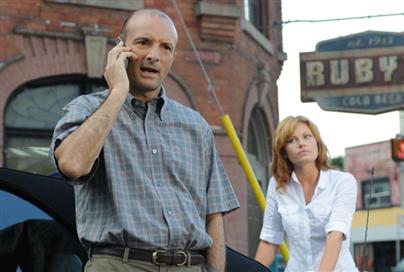The Bridge: It’s like The Wire without the moral complexity
By: Robert Cushman
Date: March 11, 2010
Source: National Post

Frank Cassini as Bernie and Ona Grauer as Abby on The Bridge.
That’s probably the newest thing about it. It’s being promoted as depicting police as real people with their own lives, and as taking on issues of corruption within and around the department; but it’s hard to think of a recent cop show that hasn’t tried to do such things. Publicists were probably making similar claims back in the days of Dragnet.
A decade or so ago, there was a brilliant British series, shown over here as Inside the Line, whose protagonist had an extremely colourful private life
and whose main job as a cop was investigating other cops. Here, admittedly, he differs from Frank, whose energies are largely devoted to opposing the investigation of other cops. He’s concerned with rooting out individual bad apples but they have to be very bad indeed: An officer, for example, who’s using his uniform to steal money from drug dealers. And even his main offence is that he’s threatened the lives of other police.
Frank’s real enemies are the brass, i.e. the departmental chiefs, and what might be called the super-brass: the bureaucrats and politicians who spread distrust of the guys on the beat. What makes him froth at the mouth is the sight of the men from the Criminal Investigation Unit, officious busybodies who arrive to ask annoying questions whenever somebody, say, dies in police custody.
The Bridge’s executive producer is Craig Bromell, former police officer, president of the Toronto Police Association and radio host: so, two-thirds of Frank’s own trajectory. As union president, he was famous for his vociferous opposition to any outside attempts to police the police. Whatever the politics of this, it makes for thin — because it’s one-sided — drama.
It’s probably unfair to compare The Bridge to The Wire (it may be unfair to compare any TV show to The Wire) but it’s inescapable. Both shows centre on loose-canon rank-and-file detectives who take a principled stand against their superiors, who in turn devote themselves to making the hero’s life miserable. Frank leads a revolt to secure a proper police funeral for an officer who’s committed suicide. He succeeds, and is elected union boss on the strength of it, but the brass will never forgive him.
The Wire’s Jimmy McNulty ran into similar problems when trying to expose the gang bosses of Baltimore; and his opponents, both within and without the force, were at least as unscrupulous as Frank’s. But they were also more human and more detailed, capable of surprising moments of decency; which in turn made Jimmy himself, a far more flawed character than Frank, more sympathetic because he was more real. They were also part of a wider civic picture.
It’s early days, of course, but so far The Bridge shows no signs of going there. Its villains are one-dimensional; there’s a female deputy chief who’s a monster of charmless (and clueless) vindictiveness, while the CIU men are filmed, and musically accompanied, like Gestapo interrogators. There are top cops with political ambitions, whom we rarely meet, and there’s a do-gooding demagogue whom Frank demands be robbed of his “bully pulpit” and whom we’ve yet to meet at all. The writing (by Alan Di Fiore, of DaVinci’s Inquest) and the performances, led by Aaron Douglas’s square-jawed Frank, are vigorous enough, but they’ve yet to display any depth or texture. This even goes for Michael Murphy, who plays a police chief with ambiguous sympathies, i.e. he’s playing both sides against the middle. Amusingly, when he and Frank have secret meetings in cars, each of them, unknown to the other, records the conversation. I think we can guess which of them, in a future episode, will resort to selective quotation.
One of Frank’s colleagues tells him that, though notionally a civilian, he still thinks and acts like a detective. This could be the show’s salvation; on the strength of tonight’s episode it’s beginning to function as another police procedural, of reasonable speed and grittiness. Frank has two sidekicks: his former patrol partner and union-rep predecessor, who’s less impulsive than he is, and a lawyer who’s also his girlfriend: another McNulty resemblance, though here too the love interest suffers in the comparison. Frank says, and the show’s publicity backs him up, that he wants to clean up the city, not just the police department, “from top to bottom.” So far, though the non-criminal civilians — the people he is sworn to serve and protect, the ones on whose behalf the show asks us to protect him — have been conspicuous by their absence.
– The Bridge airs tonight at 10 p.m. on CTV.